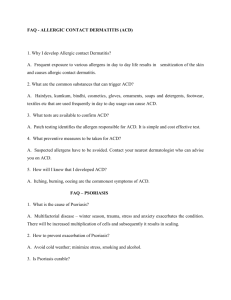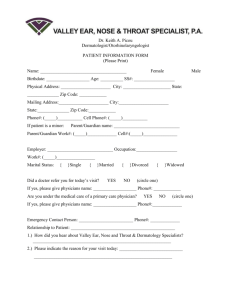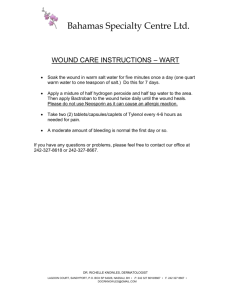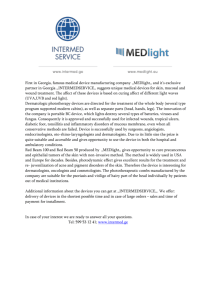Consumer`s AWARENESS Guide
advertisement
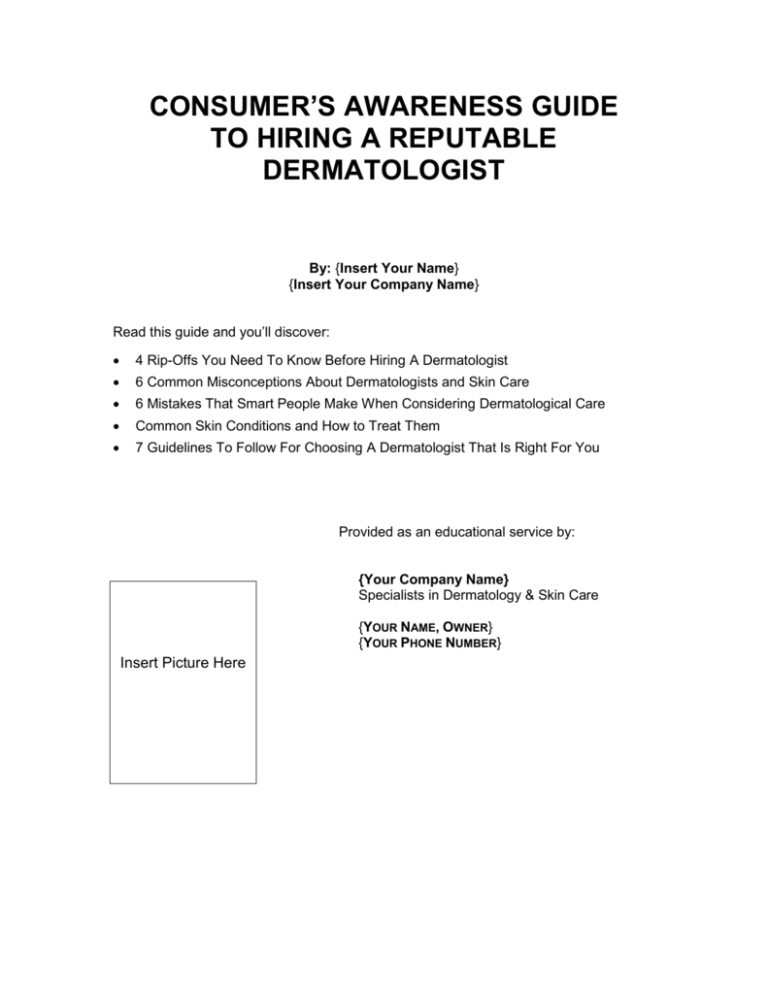
CONSUMER’S AWARENESS GUIDE
TO HIRING A REPUTABLE
DERMATOLOGIST
By: {Insert Your Name}
{Insert Your Company Name}
Read this guide and you’ll discover:
4 Rip-Offs You Need To Know Before Hiring A Dermatologist
6 Common Misconceptions About Dermatologists and Skin Care
6 Mistakes That Smart People Make When Considering Dermatological Care
Common Skin Conditions and How to Treat Them
7 Guidelines To Follow For Choosing A Dermatologist That Is Right For You
Provided as an educational service by:
{Your Company Name}
Specialists in Dermatology & Skin Care
{YOUR NAME, OWNER}
{YOUR PHONE NUMBER}
Insert Picture Here
Dear CUSTOMER,
Finding and choosing a reputable Dermatologist can be a daunting task and the impact
of choosing an inexperienced one can be damaging to the quality of your physical
appearance and overall health.
How do you ever find a qualified, competent, professional Dermatologist who truly cares
more about you, and your eye care, than making a buck…one that you can trust?
You can start by reading this Consumer’s Awareness Guide. In this fact-filled report,
you’ll discover four rip-offs, six common misconceptions and six mistakes to avoid when
choosing a Dermatologist to help you with your skin conditions. We will also provide for
you 7 guidelines to choosing a qualified Dermatologist that is right for you.
Here at {company name}, we strive to be a valuable resource for helping you clear away
fear and confusion related to optimum skin care and the role of dermatology. When it
comes to staying healthy and looking your best, we want you to make an informed
decision about choosing an experienced physician that meet your needs.
And if you have any questions about your skin conditions, you’re invited to call us at
{insert your phone}. We’ve dedicated our business to thoroughly educating our patients
and to provide them with exceptional dermatological care. We are happy to help you in
every way.
Sincerely,
{Insert Your Name}
{Insert Your Company Name}
Specialists in Dermatology & Skin Care
2
Insert Picture Here Of
Dermatology Office
Staff and / Or
Dermatologist(s)
{INSERT YOUR NAME}
{Insert your name} is the owner of {Insert Your Company Name}. {He/She} is a
licensed Dermatologist in {insert state certified} and has been in the business of
providing exceptional dermatological care for {Insert Number of Years}.
At {Insert Company Name} we are committed to helping our patients achieve the
greatest level of understanding and to educate them on the best skin care practices.
We welcome your inquiries and will gladly answer your skin care questions so don’t
hesitate to contact us. We don’t want you as “just another patient”, we want to build trust
with you and have you join the {Insert Company Name} family of satisfied patients.
{Insert Your Company}
SPECIALISTS IN DERMATOLOGY & SKIN CARE
{Insert Your Phone}
{Insert your Address}
3
Are you feeling…
•
You could make an informed decision about visiting a dermatologist if you only
knew more about their role in skin, hair and nail health and the various symptoms
and conditions that they treat?
•
Frustrated with the lack of information you receive from your primary physician
and worried about the high price of treatment?
•
Unsure about how to find an excellent dermatologist and what questions you
should be asking during the selection process?
•
Afraid that you will have to live with embarrassing skin conditions because you
cannot find an affordable dermatologist that you trust?
Rest assured that you’re not alone. In fact, here at {company name} we offer this
consumer education message to keep smart patients - just like you - from falling for
common rip offs, mistakes and misconceptions surrounding dermatology.
Read this guide in its entirety as it offers insights into ways to protect yourself from being
scammed and specific steps on how to choose a Dermatologist who will take exceptional
care of you.
FOUR COMMON RIP-OFFS YOU NEED TO KNOW ABOUT
BEFORE CHOOSING A DERMATOLOGIST
RIP-OFF #1: Bargain Deals And Discounts
Do you get giddy with excitement when you come across an outlandish bargain or
discount?
Before you risk compromising your wallet and your health, take another look at the fine
details of the dermatologic bargain you’re being sold. What you’ll find can give you
sticker shock including hidden fees that rack up your bottom line cost and aren’t
disclosed up front.
You might find that you are paying more for the so called discount deal than you would
have for a full service from a reputable dermatologist that doesn’t hide behind the small
print and provides full disclosure on all fees.
If the “bargain” you’re being sold sounds too good to be true, it probably is.
The sad truth is, some offices use lowball prices as the bait for their false and misleading
advertising to take advantage of your desire for healthy, beautiful skin. Don’t fall prey to
these techniques; follow these four simple steps to protect yourself:
- Ask about hidden fees and extras that cost additional.
4
- Verify everything that is included in the total price.
- Request a written treatment recommendation that includes all services and fees to
ensure that you are getting what you want from the exam or treatment.
- Ask for details about recommended treatments including why you need it, how it works,
if there are any alternatives and what the bottom line fee will be.
Individualized skin care is not always as cheap as some unethical dermatologists would
bait you into believing. Do your homework and don’t compromise when it comes to the
health of your skin.
RIP-OFF #2: Bait And Switch
A common dermatologist scam is to lure patients with a low exam price without revealing
all the associated costs that come along with the initial examination and treatment.
They hide behind the small print and don’t provide you with full disclosure of the fees
associated with your examination…all in the name of “getting you in the door”.
To protect yourself:
- Verify everything that is included in the advertised examination or treatment and ask
about any additional fees you may anticipate before your visit.
- Confirm that necessary follow-up visits are covered in the advertised price.
Yes, you can do some homework and ask questions, but if you have a bad feeling from
the get-go, listen to it.
RIP-OFF #3: Dermatologists Who Over-Promise And Under-Deliver
If a dermatologist is promising to give you a wildly youthful appearance, you may want to
investigate their motives for using the recommended treatment first.
Dermatologic cosmetic treatments can be big business for unscrupulous physicians who
are more interested in opening your pocket book that attaining your overall goal towards
skin care. The fact is that no physician and no product can actually turn back the hands
of Father Time.
While there are excellent, non-invasive cosmetic treatments on the market, the bottom
line is that they are only capable of improving your immediate appearance for a limited
amount of time. The skin will continue to age and treatments may need to be repeated
to attain the results you desire.
Remember, a reputable dermatologist will thoroughly examine you and discuss your
goals so that they understand your expectations. When presenting any treatment option
they should take the time to thoroughly explain the pros and cons so that you can make
an informed decision based on facts rather than over-blown promises.
5
RIP-OFF #4: Dermatologists Who Are More Interested In Product Sales Than
Performing Qualified Diagnostics of Medical Conditions
Skin-care products make up a wildly lucrative industry and have become an avenue for
those unscrupulous dermatologists to take advantage of patients.
To be 100% clear, this doesn’t mean that skin-care products that your physician
recommends are not legitimate. But you should beware physicians that overly push
products without proper examination or diagnosis first.
An ethical dermatologist will present you with treatment options that may include
beneficial products, but their #1 focus is to first and foremost take the required time to
examine your skin, hair or nails in order to properly diagnose your condition and then
make treatment recommendations based on their findings.
6 COMMON MISCONCEPTIONS ABOUT
DERMATOLOGISTS & SKIN CARE
MISCONCEPTION #1: Dermatologists Only Treat Patients with Skin Conditions
Such as Acne or Psoriasis
While patients with acne and psoriasis do find relief when treated by a reputable
dermatologist, these account for only two of the many medical and cosmetic conditions
that are successfully treatable with dermatological care.
Dermatologists are licensed doctors of medicine who specifically diagnose and treat
conditions, disorders and diseases of the skin, hair and nails. In fact, dermatological
treatment helps patients who suffer with a wide range of issues including:
-
Skin cancer prevention, diagnosis and treatment.
-
Symptoms of aging such as fine lines, wrinkles, sagging skin, sun damage and
discoloration.
-
Skin conditions such as dry skin, eczema, warts, rosacea, dermatitis, shingles,
spider veins, cold sores, discoloration, excessive sweating, bacterial or fungal
infections and as previously mentioned acne and psoriasis.
-
Hair conditions such as hair loss, thinning, dandruff, lice, folliculitis, unwanted or
excessive hair growth, ingrown hairs and thin eyelashes or eyebrows.
-
Nail conditions including bacterial and fungal infections, brittle or splitting nails,
and discoloration.
-
Cosmetic concerns such as stretch marks, moles, skin tags, tattoos, scars,
redness or blotchiness, large pores and as previously mentioned aging concerns.
By far, the majority of patients who seek dermatological care are extremely pleased with
the results including healthy and radiant skin that they can be proud of.
6
MISCONCEPTION #2: You Only Need to Visit a Dermatologist If You Have Medical
Symptoms or Cosmetic Concerns
This misconception is not only false, but potentially deadly.
In fact, dermatologists practice a critical form of preventative treatment. The single most
important reason that you should see a dermatologist is for a skin cancer screening…
…And this should be an annual appointment!
While your primary physician may examine your skin during an annual physical, it’s
important to keep in mind that they do not specialize in dermatology and may not be
optimally trained to perform a thorough exam.
Skin cancer diagnoses are rising faster than any other form of cancer. While they are
nearly 100% curable when caught early, the scary fact is that a miniscule percentage of
the population under-go skin cancer screenings or even protect themselves from the sun
to begin with!
To protect yourself:
- Apply adequate amounts of sunscreen to your face, chest, arms, legs, lips, ears, scalp,
hands, feet, neck - basically you need to apply sunscreen to just about every part of your
body covered with skin!
-
Use sunscreen with UVA and UVB protection
-
Reapply every two to three hours
-
Reapply after swimming or sweating excessively
-
Wear protective clothing and hats
-
Give yourself self-skin exams monthly
-
Visit your dermatologist annually for thorough skin examinations
MISCONCEPTION #3: I Don’t Need to See a Dermatologist Because I Use Overthe-Counter Medical/Cosmetic Skin Care Products
Ranging from promises to get rid of acne to preventing and reversing the signs of aging,
the skin care product industry rakes in billions of dollars a year and preys upon the
desires, fears and medical conditions of many while emptying their pocketbook.
Too many people are reeled in by advertisements that overpromise and under deliver.
Sometimes even promising results that are scientifically impossible!
How do they get away with this? Many skin-care products don’t have to answer to strict
FDA guidelines because they are simply beauty products and not drugs. Therefore, they
7
do not have to prove that their product does what it advertises and they hide behind
vague promises.
To keep from living with a revolving door of products and throwing your money at great
advertisements, consult a dermatologist. As medically trained physicians, dermatologists
can distinguish between conditions that share similar symptoms and help you avoid
paying for products and treatments that will not help your condition. With their guidance
you can keep from becoming overwhelmed by the abundance of choices and promises
that skin care products make.
While there are many great products available on the market today that serve patient’s
needs, you don’t have to navigate the skin-care gauntlet and throw away hundreds of
dollars to find the right product for you. Consult with your dermatologist who can point
you in the right direction to reach your goals.
MISCONCEPTION #4: It’s Too Expensive to See a Dermatologist
The thought of visiting any physician can be stressful for many people. By far the
biggest reason I have heard, is the cost.
Like any other service, there are many aspects that play a part in the cost of
dermatologic care including having or not having insurance, treatment alternative
options, availability of payment plans, etc…
But here are two unavoidable facts:
1. Skin is our first line of defense against the world. It protects us, and we are
responsible for keeping it healthy.
2. An annual skin cancer screening and full skin examination is just as important as
annual eye exams, breast exams, teeth cleanings, etc…
To protect yourself from surprise costs:
-
Protect your skin from sun exposure by properly using sunscreen and protective
clothing.
-
Before allowing a dermatologist to treat you, be sure to have them discuss all of
your treatment options and the associated fees and request a written quote.
-
Verify that the written quote includes every procedure that you are expected to
pay for including the initial examination and treatment.
Bottom line - Making your skin health a priority today will be more affordable than paying
the price for procrastination tomorrow!
8
MISCONCEPTION #5: The Dermatologist With the Cheapest Ad is the Best Choice
Cheaper doesn’t equal better.
Here are THREE REASONS why:
1. A low price can be the bait that attracts your initial consultation only to be
informed of terms and conditions that you don’t meet in order to qualify for the
advertised special. Once you are there you will be faced with high pressure
sales tactics pitching a much more expensive procedure or treatment plan.
2. Low price often equals the bare minimum service. This means that you’ll be
facing hidden fees for required labs, follow-up care or products/prescriptions to
treat your condition.
3. Low price can mean an inexperienced physician.
To protect yourself:
-
Request a complete written list of all examinations and treatments required and
the fee for each service
Get a final total in writing
Verify that necessary follow-up visits are included in the overall fee
Get total clarity that the advertised price applies to your condition and the
treatment you need
Request referrals from past patients or staff who may have undergone the same
diagnosis and treatment
Verify the dermatologist’s credentials and experience
Bottom line, dermatologic care is never as cheap as unethical physicians would have
you believe. Don’t risk your health and outward appearance to save a few bucks.
MISCONCEPTION #6: All Dermatologists Are Basically The Same
Not all dermatologists are created equal.
Every dermatologist you meet will have different skill levels, different treatment
preferences, and different business practices.
To make an informed choice, ask the following questions of each dermatologist you
interview:
-
Are you board certified? What are your credentials?
What is your range of dermatologic services?
Do you specialize in a specific area?
Have you had additional training related to your specialties?
Have you treated patients with similar symptoms/conditions? How many and with
what results?
9
- What treatments and practices do you subscribe to?
- Will you provide patient references?
- How long will I have to wait for an appointment?
- Do you accept insurance? Does my insurance meet your criteria?
Knowing your dermatologists specialty training, skills and level of experience can help
you choose a physician that’s right for your needs and goals. If a dermatologist doesn’t
openly communicate with you or take the time to answer questions, move on to the next
one!
6 MISTAKES SMART PEOPLE MAKE WHEN CONSIDERING
DERMATOLOGICAL CARE
MISTAKE #1: Not Recognizing Personal Habits and Environmental Factors That
Trigger Negative Affects In Your Dermatologic Health
To optimize the health of your skin, hair and nails it helps to recognize the personal
habits and environmental factors that affect them including:
-
Climate
Stress
Product usage
Smoking
Drinking
Use of sunscreen
Medications
Once you recognize triggers that may negatively impact your dermatologic health, you
have a better chance of treating it successfully.
MISTAKE #2: Choosing a Dermatologist Based On Price, Location or Availability
Remember… you get what you pay for.
Having low prices, a location that’s close to home or immediate availability IS NOT the
first thing you should look for in a dermatologist.
Your first step should always be verifying that the dermatologist and staff are qualified,
experienced, properly trained and capable of providing necessary care.
Here are some good questions to ask:
-
Is the physician a licensed and board certified dermatologist in your state?
-
How much experience do they have with your skin condition concerns and can
you see referrals and testimonials from current patients?
10
-
Can you expect prompt attention from a front office receptionist that treats you
with respect and keeps a tight running ship?
-
Do they guarantee quality care and treatment and promote optimum health as
opposed to keeping majority of their focus on product promotion?
-
Does the entire team, including the dermatologist, demonstrate good
communication skills?
-
Do they accept your insurance?
When choosing a dermatologist ask questions and do your homework and you will find a
match that’s right for you and your needs.
MISTAKE #3: Not Taking the Time to Verify Qualities That Are Important In a Great
Dermatologist
Many patients will do some research online or get referrals from friends to verify a
dermatologist’s qualifications and credentials… but what about their qualities and ethics?
When choosing a dermatologist it’s important to meet with them and verify these
qualities and practices that great dermatologists demonstrate:
-
Strong communication skills
Reasonable accessibility
Willingness to spend quality time to diagnose and treat your condition
A demeanor that you’re comfortable with
Thoughtful and forthcoming answers to your questions
A willingness to get back to you with answers to questions
While credentials are critical to choosing a dermatologist, you don’t want to ignore
qualities and ethics that may or may not resonate with you because it’s important that
your relationship with your dermatologist is honest and based on communication.
MISTAKE #4: Choosing a Dermatologist Based on a High Pressure Consultation
Often times the overwhelming desire to have healthy, beautiful skin can play a big part in
making bad decisions; so remember this should be a business deal not an emotional
encounter.
Shady dermatologists seek out and take advantage of patients who are desperate to
“cure” their condition because they make easy marks who will pay for any and all
treatments or products an unscrupulous dermatologist can throw at them.
You can avoid falling victim to high-pressure, fear inducing tactics by taking the following
precautions:
1. Ask questions and demand clear communication from the beginning. If a
dermatologist will not take the time to discuss your expectations and properly
11
exam and diagnose your condition before pressuring you into expensive product
sales, walk away and find a physician that will.
2. Request a written estimate that includes an itemized list of examinations,
procedures and fees before agreeing to any treatment. Practice due diligence by
checking for hidden fees and extras that can potentially rack up your final bill.
3. Be sure that you are getting everything you need for the promised fee.
4. Don’t let your desire to have healthy, beautiful skin overshadow the importance
of your patient rights by accepting less than you need.
5. Call around and meet with several dermatologists until you find one that you trust
and who can truly meet your needs and budget.
MISTAKE #5: Settling For A Dermatology Team Who Doesn’t Bestow The
Courtesies That You Deserve
Doesn’t it just make sense that as a valued patient every dermatology team should give
you the courtesy and respect you deserve?
Common courtesies are often overlooked through the initial selection process, but
they’re at the top of the list for patient complaints. Here’s some do’s and don’ts for
choosing a dermatologist office that promotes a positive experience:
DON’T choose an office that:
-
Lacks open and honest communication
Radiates chaos and confusion
Talks down to you
Advertises a low price and then pressures you into expensive add-ons or
unnecessary product sales
DO choose a dermatology team that:
-
Keeps you fully informed and offers experienced advice that always has your
best interest in mind
Respects your time
Treats you with complete dignity and respect
Takes your financial limitations into consideration and works with you to make
treatment affordable
12
MISTAKE #6: Choosing a Dermatologist Without Getting The Real Scoop From
Other Patients
Too many people fall victim to low-ball prices and quick talking dermatology teams who
exaggerate their experience and over promise results.
Never choose a dermatologist on their word alone. Make sure you verify their credentials
and then ask for references. If no reference is made available to you, go online and
search for comments and feedback from current and past patients and with the
applicable certification boards.
This is critical to relieving worries about falling victim to inexperienced or unethical
dermatologists and to keeping you informed so that you can make a smart decision and
receive quality care from a doctor you trust.
This little bit of extra time and effort can save you from a lot of hassle and heartache.
COMMON SKIN CONDITIONS AND HOW TO TREAT THEM
Acne
Acne, commonly called "pimples" or "zits", is most common among teenagers but can
affect people of all ages. The common treatments are over-the-counter medications,
such as benzoyl peroxide (Proactiv, Clearasil). If you use these products without
success, you should consult a dermatologist since acne can leave permanent scaring.
As a treatment, dermatologists often prescribe medications such as Accutane, Differin,
Epiduo, Retin A Micro, or Tazorac, which leads to a more immediate result and longterm control.
Actinic Keratoses (AKs)
AKs are dry, scaly patches that result from chronic sun exposure. If you notice areas
such as these, take note since they are considered precancerous and should be
evaluated by a dermatologist. Treatment options for actinic keratoses include
cryotherapy, excision, and topical medications, such as 5-FU and Zyclara (imiquimod)
Cream 3.75%.
Aging Skin
Aging Skin is a very natural occurrence since the skin becomes thinner, develops fine
lines and wrinkles, develops darkened spots, and becomes drier over time. Treatment
options include botulinum toxin (Botox, Dysport), dermal fillers (Juvederm, Restylane)
chemical peels, and laser and light therapies.
Atopic Dermatitis
This is the most common type of eczema which affects more than 1 in 10 people.
Eczema treatment includes frequent application of moisturizers, topical corticosteroids,
antihistamines and topical immunomodulators (Elidel, Protopic).
13
Botox Cosmetic Treatment
Procedures such as laser resurfacing dermabrasion and chemical peeling primarily treat
wrinkled skin at rest or “static wrinkles”. Botox, on the other hand, is the treatment of
choice for movement-related wrinkles or “dynamic wrinkles” such as "scowl" (frown)
lines between the eyes, horizontal "worry" lines on the forehead and "crow's feet" lines
on the sides of the eyes, which in many cases may be eliminated entirely with treatment.
Dermal Filler Treatments
Injectable filling and volumizing agents are now available for the treatment of fine and
moderate wrinkles, correcting sunken areas, re-contouring surface irregularities and
restoring fullness to the skin. Dermal Fillers include hyaluronic acid products, such as
Hylaform, Captique, Elevess, Restylane, and Juvederm, and volumizers, such as
Radiesse and Sculptra. Unlike collagen, these substances, largely synthetically
produced, do not require any prior allergy testing. This means a person could literally
walk in off the street and be treated the same day and expect the results to last far
longer i.e. for 12 to 24 months or even longer.
Psoriasis
Psoriasis is a chronic skin condition with "plaque" type being the most common. There
isn’t a cure, but your dermatologist can prescribe a variety of treatment options, including
topical corticosteroids, topical retinoids, phototherapy, and new biologics, such as
Stelara and Vectical.
Rosacea
Rosacea causes redness and swelling of the face. People may first notice a tendency to
flush or blush easily which may progress to persistent redness, pimples and other
changes. There are four subtypes of rosacea and people may have more than one
subtype at the same time. There are a variety of treatment options for rosacea, including
topical medications (Finacea, MetroGel, Plexion), oral medications (Oracea), and laser
and light treatments.
Skin Cancer
Skin Cancer is usually classified as one of 3 types; basal cell carcinoma (BCC),
squamous cell carcinoma (SCC), and melanoma. Basal Cell carcinoma accounts for 8085 percent of skin cancers. Although the least common, melanoma is the leading cause
of death from skin disease. See your dermatologist immediately if you are concerned
about the appearance of any skin lesions. Early diagnosis increases the chances of
receiving effective treatment; treatment options include excision, Moh's surgery, and
topical medications, such as 5-FU and Aldara.
Skin Care Regimens
Keeping the skin clean is important and having a good skin care regimen is critical. The
best solution is to keep it simple. Wash with a gentle soap or cleanser twice a day and
never scrub with an abrasive cloth or rough sponge. Use a moisturizer with a sunscreen
with a sun protection factor (SPF) of 15 or higher in the morning. Use oil-free makeup
that is non-comedogenic, so that it will not block pores. Use a biologically active cream
containing ingredients such as alpha (glycolic) or beta hydroxy acid or antioxidants
(Prevage) once or twice a day. A skin care regimen can include using a topical retinoid
cream (Retin A, Renova, Tazorac, Avage, or Differin) or another vitamin A derivative
(retinol) nightly.
14
7 GUIDELINES TO FOLLOW FOR CHOOSING A
DERMATOLOGIST THAT IS RIGHT FOR YOU
As we said in the beginning, finding and choosing a reputable Dermatologist you can
trust can be a very daunting task. In summary, here are 7 guidelines to help narrow
down the selection process for finding the right one for you.
GUIDELINE #1: Ask a friend or someone you and trust know for a referral. This will
probably be the best and most effective way to start.
GUIDELINE #2: The Dermatologist you select should give you a free initial consultation
to discuss your skin care needs and answer any of your questions.
GUIDELINE #3: Ask the Dermatologist detailed questions about your specific condition
and their experience in treating similar conditions.
GUIDELINE #4: Make sure the doctor is willing to sit down and spend the time with you
to answer any questions you have regarding any treatment. If not, move on to the next
dermatologist.
GUIDELINE #5: Insure the doctor thoroughly explains any procedure or treatment
process and how you can prepare yourself for it. Be sure they also explain the best
practices for maintaining your skin “post-treatment”.
GUIDELINE #6: Make sure you are comfortable with the doctor’s bedside manner, and
that of their entire team. Does he/she give you the amount of respect as a person and
as a patient?
GUIDELINE #7: Your skin is the largest and most visible organ on the body and acts as
a barrier to disease. Before entrusting just any dermatologist to handle your skin
treatments, it’s important to be sure to verify the Dermatologist’s credentials NOT select
a surgeon on price alone. This is an important decision that can affect your health and
appearance for the rest of your life so take your time, do your due diligence and request
testimonials from past clients.
15
THANK YOU!
THANKS AGAIN for reviewing our new Consumer’s Awareness Guide To Hiring a
Reputable Dermatologist. It’s our hope that you found this information helpful and useful
in helping you choose a Dermatologist you can trust.
As we mentioned earlier, we are committed to helping you achieve the greatest level of
skin care and to make sure you are fully informed to make the best decision about
finding a Dermatologistwho is committed to your skin care and beautifying your
appearance.
Here at {insert company name}, we strive to be a valuable resource for helping you
clear away any fear and confusion related to common misconceptions about skin care
and treatments so that you can make an informed decision about choosing an
Dermatologist that meets your needs.
If you have any questions or comments about skin care or if you would like to schedule
an appointment –please call us at {Insert Your Phone Number}. We’d love for you to
join the {Insert Company Name} family of satisfied patients.
We look forward to your call and to meeting you in person.
Thank you!
Sincerely,
{Insert Your Name}
{Insert Your Company}
{Insert Your Phone Number}
16
HERE’S WHAT OUR PATIENTS ARE SAYING ABOUT US
{Testimonial Section: Insert Testimonials Here}
17


